This article was co-authored by Jurdy Dugdale, RN. Jurdy Dugdale is a Registered Nurse in Florida. She received her Nursing License from the Florida Board of Nursing in 1989.
There are 8 references cited in this article, which can be found at the bottom of the page.
This article has been viewed 101,621 times.
Creatinine is a chemical byproduct that your muscles produce through normal usage. In a healthy body, the kidney will filter creatinine out of your bloodstream. Your body will then expel the creatinine via urine. A low level of creatinine typically indicates a loss of bodily muscle mass or malnutrition, and can also be a side-effect of pregnancy. Remedy this through adding more protein to your diet and performing low-intensity exercises several times a week.
Steps
Increasing Creatinine through Your Diet
-
1Consume a healthy calorie amount for your height and weight each day. A creatinine deficiency can be a sign of malnourishment, meaning that your body isn’t taking in enough calories and nutrients to sustain itself. Fill your diet with healthy food including vegetables, fruits, proteins (including meats, eggs, and dairy), and grains.[1]
- The amount of food an individual should eat on a daily basis depends on their age, weight, and height. Find a more personalized suggested daily calorie count online at: https://www.calculator.net/calorie-calculator.html.
-
2Eat more red meat on a daily or weekly basis. If your creatinine levels are low, introduce more meat into your diet. The creatine found in meats—especially red meat—will boost the amount of creatinine in your bloodstream. While white meats like chicken will benefit your creatinine levels as well, red meat will yield quicker results.[2]
- So, incorporate steak, hamburger, pork chops, or other red meats into your diet at least 4–5 times per week.
Advertisement -
3Increase your daily protein intake if you’re a vegetarian. Since eating meat increases creatinine levels in the bloodstream, vegetarians often suffer from low creatinine levels and a general protein deficiency. Treat this deficiency by adding vegetarian-friendly proteins to at least 1 meal a day.[3] Vegetarians can boost their protein intake through protein-rich foods including:
- Lentils and nuts
- Greek yogurt and eggs
- All types of beans
-
4Take creatine supplements if you exercise frequently. Creatine dietary supplements are commonly used by weightlifters to increase muscle mass and build bulk. This practice is fine for your body, as long as you’re working out at least 5–6 times a week and performing high-intensity exercises. If you take creatine as a supplement and only work out at low or medium intensities, you will likely give your body more creatine than it needs.[4]
- In serious cases, this could raise your creatinine levels dangerously high.
Raising Creatinine through Lifestyle Changes
-
1Perform low-intensity exercises to build muscle mass. Creatinine derives from your skeletal muscles. If your creatinine levels are low, perform some gentle exercises to increase the amount of muscle on your skeleton. The increase in muscle mass will cause a corresponding rise in creatinine.[5] Low-intensity exercises include things like jogging, jumping rope, or swimming.
- To avoid overtaxing your system, only exercise for 20-30 minutes at a time.
-
2Drink a moderate amount of alcohol to slightly raise creatinine. Alcohol has been linked to a raise in overall creatinine levels. While alcohol should never be taken as a type of medicine, low to moderate drinking can increase creatinine in your bloodstream.[6]
- Women should restrict themselves to only 1 alcoholic drink a day, while men should restrict themselves to no more than 2 per day.[7]
- Avoid sugary alcoholic beverages. Instead, choose options like red wine or stout beer.
- Do not drink alcohol if you have a known kidney disease or disorder. Alcohol consumption could worsen the condition.
-
3Don’t worry about low creatinine levels during a pregnancy. Pregnant women may experience a dip in their creatinine levels, due to normal hormonal shifts and the fact that their body is nourishing a growing fetus. Unless creatinine levels become dangerously low, this can’t be helped during the pregnancy itself. Creatinine levels should return to normal once the pregnancy is finished.[8]
- If you’re pregnant and have low creatinine, ask your doctor if a change in diet or use of creatine supplements would benefit you.
-
4Avoid fasting if you have low creatinine levels. Many people fast for religious or otherwise personal reasons. Since your body receives fewer nutrients during a fast, it can cause a sharp dip in creatinine levels in your blood.[9] If you must fast, do so in a way that allows you to still eat a little each day.
- If you don’t eat for extended periods of time because of an eating disorder, talk to a medical doctor or professional therapist for assistance.
Warnings
- If you have diabetes or a kidney-related health problem, or have already-high levels of creatinine in your body, raising your creatinine levels may be unhealthy. Check with your doctor before you start taking creatine supplements to ensure they won’t damage your health.[12]⧼thumbs_response⧽
References
- ↑ http://www.heart.org/en/healthy-living/healthy-eating/eat-smart/nutrition-basics/suggested-servings-from-each-food-group
- ↑ http://blogs.davita.com/kidney-diet-tips/dietary-protein-bun-creatinine-connection/
- ↑ http://blogs.davita.com/kidney-diet-tips/dietary-protein-bun-creatinine-connection/
- ↑ https://www.medicalnewstoday.com/articles/319892.php
- ↑ https://www.medicalnewstoday.com/articles/319892.php
- ↑ https://academic.oup.com/ndt/article/20/8/1610/1921966
- ↑ https://www.mayoclinic.org/healthy-lifestyle/nutrition-and-healthy-eating/in-depth/alcohol/art-20044551
- ↑ https://www.medicalnewstoday.com/articles/319892.php
- ↑ https://www.medicalnewstoday.com/articles/319892.php

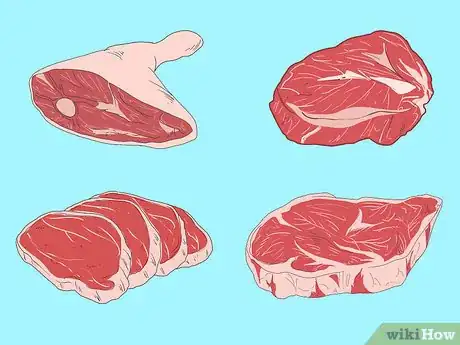

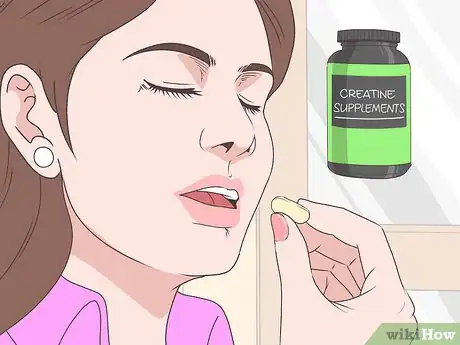




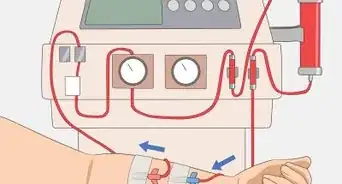



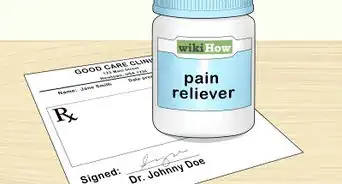

















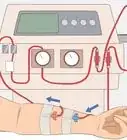

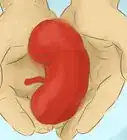




































Medical Disclaimer
The content of this article is not intended to be a substitute for professional medical advice, examination, diagnosis, or treatment. You should always contact your doctor or other qualified healthcare professional before starting, changing, or stopping any kind of health treatment.
Read More...